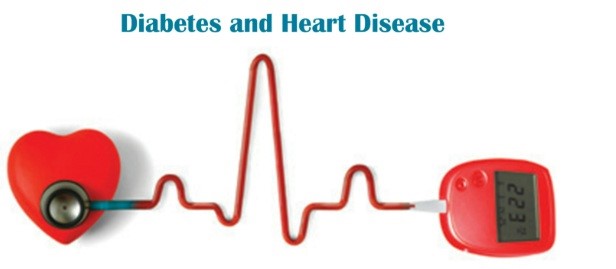
Diabetes and heart disease are two of the most common chronic health conditions worldwide. While they're often treated as separate health concerns, there's a strong and well-established connection between the two. In fact, people with diabetes are at a significantly higher risk of developing heart disease compared to those without diabetes. Understanding the link between diabetes and heart disease is crucial for prevention, effective management, and improved long-term health outcomes. For those at risk, consulting the best diabetology doctor in Mumbai can provide expert guidance to manage both blood sugar and cardiovascular health proactively.
Diabetes is a metabolic complaint that affects how the body processes glucose( sugar) in the blood. The two main types are
Both types affect in elevated blood sugar situations, which, over time, can damage organs and systems throughout the body.
Heart complaint, or cardiovascular complaint( CVD), refers to a range of conditions affecting the heart and blood vessels. These include
Heart disease is often caused by a buildup of plaque (atherosclerosis) in the arteries, which restricts blood flow and increases the risk of clots. Consulting the Best Cardiology doctor in Mumbai can help with early diagnosis, risk assessment, and personalized treatment plans to manage or prevent serious cardiovascular complications.H2- The Statistical Connection
People with diabetes are two to four times more likely to develop heart disease than those without it. According to the American Heart Association, at least 68% of people aged 65 or older with diabetes die from some form of heart disease, and 16% from stroke. Type 2 diabetes and heart disease share many common risk factors, such as obesity, high blood pressure, high cholesterol, and a sedentary lifestyle. However, even after accounting for these factors, diabetes itself independently increases the risk of heart-related complications. Seeking care at the top diabetology hospital in Mumbai can ensure comprehensive management of diabetes and its associated cardiovascular risks.
There are several reasons why individualities with diabetes are more susceptible to heart complaint
Chronically high blood sugar can damage blood vessels and the jitters that control the heart. This damage contributes to the hardening of highways( atherosclerosis), a leading cause of heart attacks and strokes.
In type 2 diabetes, the body becomes resistant to insulin. This condition frequently coexists with other metabolic issues like elevated triglycerides, low HDL(" good") cholesterol, and high LDL(" bad") cholesterol — all of which increase cardiovascular threat.
Diabetes can beget low- grade habitual inflammation throughout the body. Inflammation plays a crucial part in the development of atherosclerosis and can destabilize pillars in the highways, making them more likely to rupture and beget heart attacks or strokes.
Hypertension is common among people with diabetes and can further strain the heart and highways, aggravating the threat of cardiovascular complaint.
Numerous individualities with type 2 diabetes are fat or fat, and may lead sedentary cultures. Both of these factors are major contributors to heart complaint.
One of the challenges in managing the dual risk of diabetes and heart disease is that symptoms can be subtle or mistaken for each other. For example, fatigue, shortness of breath, or nausea can occur with both high blood sugar and heart-related issues. Additionally, people with diabetes are more likely to experience “silent” heart attacks—cardiac events with little or no noticeable symptoms—due to nerve damage (diabetic neuropathy). Seeking timely evaluation and care from the Best heart hospital in Mumbai can help detect these hidden risks early and provide integrated treatment for both conditions.
While the link between diabetes and heart complaint is strong, it’s not ineluctable. numerous life changes and medical interventions can reduce the threat:
Maintaining blood glucose within the target range is critical. This can be achieved through:
A heart-healthy diet includes
Regular physical exertion improves insulin perceptivity, helps control weight, lowers blood pressure, and strengthens the heart. Aim for at least 150 twinkles of moderate- intensity exercise per week, similar as brisk walking, swimming, or cycling.
Losing indeed a small chance of body weight( 5- 10) can significantly reduce the threat of cardiovascular complications for people with diabetes.
Regular wireworks and, when necessary, specifics like statins or ACE impediments can help keep blood pressure and cholesterol in check, guarding the heart and blood vessels.
Smoking doubles the threat of heart complaint in people with diabetes. Quitting smoking is one of the most poignant effects you can do for heart and overall health.
Habitual stress can negatively impact blood sugar situations and cardiovascular health. ways like awareness, contemplation, remedy, and regular exercise can be helpful.
If you have both diabetes and heart disease, treatment strategies often overlap and require close collaboration between your healthcare providers. Your doctor may recommend medications to control blood sugar, such as metformin, GLP-1 receptor agonists, or SGLT2 inhibitors—some of which also help reduce cardiovascular risk. Early detection and integrated care are crucial. Regular check-ups, lab tests, and cardiovascular screenings are essential parts of long-term disease management. Choosing a Heart Specialist hospital in Mumbai can ensure comprehensive, coordinated care for both your heart and metabolic health.
Living with diabetes and precluding heart complaint can be inviting, especially when both conditions cross. Education, community support, and case- centered care are vital.
Diabetes education programs can educate practical strategies for managing blood sugar, nutrition, and physical exertion.
Cardiac recuperation may be recommended for people recovering from heart events, offering supervised exercise and life education.
Support groups, whether in- person or online, can help cases feel less insulated and further empowered.
The link between diabetes and heart complaint is strong and inarguable, but it is n't a life judgment . With the right knowledge, visionary life changes, and medical operation, individualities with diabetes can significantly reduce their threat of cardiovascular complications. The key is to understand the connection, take early action, and work nearly with healthcare professionals to produce a substantiated plan for long- term health and well- being.